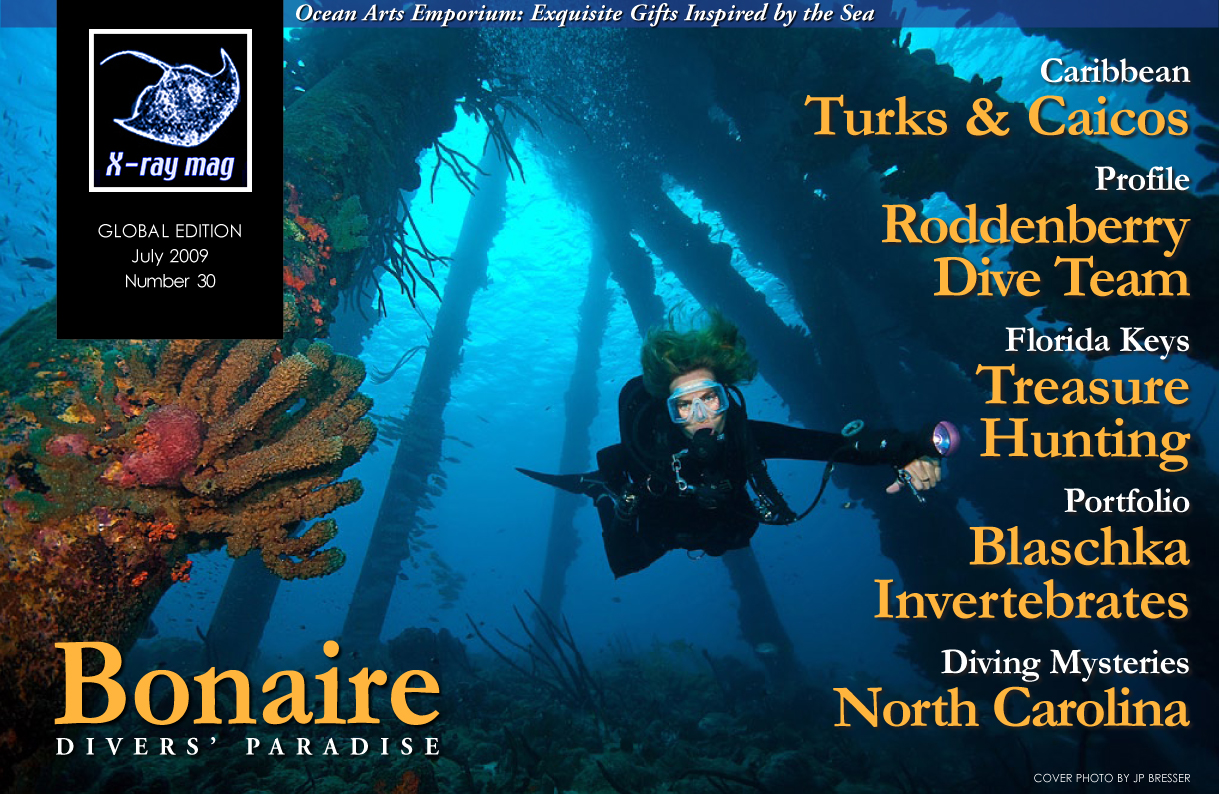This summer, Harvard Museum of Comparative Zoology in Cambridge, Massachusetts, USA, is mounting an exhibit of glass models of marine invertebrates made by the 17th century German master glassblowers, Leopold and Rudolf Blaschka of Dresden. Professor James Hanken is an evolutionary biologist and the director of the museum. He talked to X-RAY MAG about the exhibit and the Blaschka glass works.
X-Ray Mag #30
Feature articles in this issue with stand-alone pdfs
The small island of Bonaire is part of the island group called the Dutch Caribbean and is located in the southern part of the Caribbean Sea near the coast of Venezuela. Bonaire is formed by volcanic rock about 60 million years ago and later covered with coral stone. These processes created a landscape with hills in the northwest, terraces in the middle and flatland in the south.
I could hear a low rumble as detonated explosives echoed down long empty corridors and through multiple decks of steel. Three hundred and sixty-six feet of ship began to groan and creek while water rushed in to claim its above water existence. Watching from a safe distance, former crewmembers and excited divers marveled at enormous geysers of escaping air mixed with water while the HMCS Saskatchewan began its final objective —to become Nanaimo’s next artificial reef of steel. As with previous retired Canadian military ships, the Saskatchewan gracefully accepted its place in Canadian history as the fifth Destroyer Escort to be transformed from a once powerful tool of war into British Columbia’s newest dive site.
I once had a cat that approached me exactly like that. Coming right at me, top of the head first until … bump … “scratch me!” It then slowly rolled over onto its back to blissfully enjoy a good belly-rub.
Only this ‘kitty’ was a 2000-pounder, with flippers instead of paws, but still, unmistakably cute and cuddly. A close encounter with the docile manatee leaves no one untouched. These gentle giants seem friendly and curious, as they seek out close contact with humans.
As I stand on the upper deck of the Midnight Express, one of two dive boats operated by Olympus Dive Center, goose bumps cover my arms and a chill lies buried deep inside. Perhaps it is the weather or the dives awaiting me after the two hour cruise. More than likely it is both.
This brisk November morning, under skies laden with dark, cumulus clouds, the seas are rough and a most ominous stage is set. It will not be long before I explore an underwater tomb, a reminder of the wages of war, a remnant of the follies of man.
Carrying all we would need for the next five days, our expedition team travelled some 65 kilometres through shallow, meandering channels in small power boats. We eventually reached Jugu Juga, the small island which was to be our home for the next two days. As we unloaded our equipment and started to pitch camp, a bull elephant with tell tale ‘tears’ staining his face repeatedly charged us, only veering off when our guide beat two metal plates together. The strong smelling discharge, rich in testosterone, running down his cheeks announced that he was in 'musth'.
This was my introduction to the “really wild”— the Okavango Delta in Botswana.
Not all technical dives end up successfully; unforeseen circumstances often make an elaborate dive plan go completely wrong. What will a person do when it’s a question of life or death? Give it all up and submit, or fight until the end, trying to find the way out?
These are special photographic techniques that have long been used for many years by both professional and amateur land photographers to add creativity to an otherwise boring shot.
At the moment there are approximately 5000 marine protected areas (MPAs), located around the world. Still only 0.7 % of the world’s oceans are protected this way. They all share a common goal, to protect the sea and land within and everyone who lives within their boundaries. How they actually function, the scope of protection they enjoy, or how research is done, however, differs greatly.
Situated 25 km (15 miles) north of the Scottish mainland, the Orkney Islands are located on the same latitude as southern Greenland, Alaska and Leningrad, however Orkney is bathed in the warm waters of the North Atlantic Drift that first started out as the Gulf Stream in the Caribbean.
Hence, a profusion of marine life, water that rarely gets too cold and mild winters, whilst the islands are inevitable windy, the almost landlocked bay of Scapa Flow is sheltered for diving all year round.
Situated 25 km (15 miles) north of the Scottish mainland, the Orkney Islands are located on the same latitude as southern Greenland, Alaska and Leningrad, however Orkney is bathed in the warm waters of the North Atlantic Drift that first started out as the Gulf Stream in the Caribbean.
Hence, a profusion of marine life, water that rarely gets too cold and mild winters, whilst the islands are inevitable windy, the almost landlocked bay of Scapa Flow is sheltered for diving all year round.
All artifacts and other features, such as a ship’s timbers, are measured, drawn in detail, and photographed. Archaeological excavation underwater is usually done by hand with the aid of a hand-held dredge, commonly called an “air-lift.” Sediment is often screened so that not even the smallest artifact is lost.
The Star Trek Legacy goes underwater
Oh yes, the sharks are circling. Can you say ‘Amen’? With an accent hinting of both Popeye the Sailorman and Quint from the movie Jaws, I call to alert my own mateys. It is my best and worst pirate imitation. But, it is appropriate. Aye, it is right as rain.











